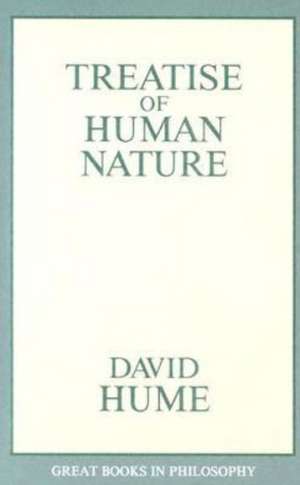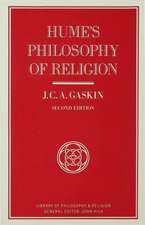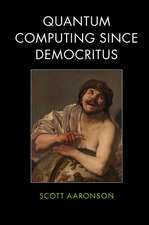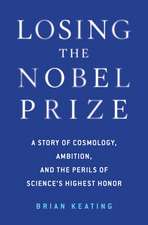A Treatise of Human Nature: Great Books in Philosophy
Autor David Hume Editat de Robert M. Baird, Stuart E. Rosenbaumen Limba Engleză Paperback – 31 mai 1992
These words sum up David Hume's plan: To discover the fundamental principles at work in the nature and extent of human knowledge, and in so doing to gain a clearer understanding of our perception, ideas (e.g. of cause and effect), impressions, beliefs, passions, virtues, and vices. Hume's piercing critique and relentless analysis make this truly one of the most influential works of the Early Modern period.
| Toate formatele și edițiile | Preț | Express |
|---|---|---|
| Paperback (25) | 74.13 lei 3-5 săpt. | |
| CreateSpace Independent Publishing Platform – | 74.13 lei 3-5 săpt. | |
| CREATESPACE – | 80.21 lei 3-5 săpt. | |
| Dover Publications – 31 dec 2003 | 94.40 lei 3-4 săpt. | +39.11 lei 5-11 zile |
| Penguin Books – 30 oct 1985 | 96.93 lei 3-5 săpt. | +19.59 lei 5-11 zile |
| CreateSpace Independent Publishing Platform – | 97.03 lei 3-5 săpt. | |
| CREATESPACE – | 99.79 lei 3-5 săpt. | |
| Prometheus Books – 31 mai 1992 | 117.00 lei 3-5 săpt. | |
| CREATESPACE – | 120.00 lei 3-5 săpt. | |
| CREATESPACE – | 150.26 lei 3-5 săpt. | |
| CREATESPACE – | 152.51 lei 3-5 săpt. | |
| – | 162.32 lei 3-5 săpt. | |
| CREATESPACE – | 162.81 lei 3-5 săpt. | |
| CREATESPACE – | 181.63 lei 3-5 săpt. | |
| Broadview Press Inc – 22 iul 2023 | 196.48 lei 3-5 săpt. | +55.97 lei 5-11 zile |
| – | 198.31 lei 3-5 săpt. | |
| – | 215.46 lei 3-5 săpt. | |
| Alpha Editions – 22 dec 2017 | 269.40 lei 3-5 săpt. | |
| CreateSpace Independent Publishing Platform – | 128.33 lei 6-8 săpt. | |
| Digireads.com – 10 iun 2019 | 129.87 lei 6-8 săpt. | |
| – | 147.25 lei 6-8 săpt. | |
| Echo Library – 31 dec 2011 | 184.53 lei 38-44 zile | |
| NuVision Publications – 17 iul 2007 | 204.30 lei 38-44 zile | |
| Classy Publishing – 5 apr 2023 | 239.99 lei 6-8 săpt. | |
| Theophania Publishing – | 270.45 lei 6-8 săpt. | |
| OUP OXFORD – 27 ian 2000 | 279.75 lei 31-37 zile | |
| Hardback (3) | 254.79 lei 6-8 săpt. | |
| Binker North – 30 sep 1839 | 254.79 lei 6-8 săpt. | |
| NuVision Publications – 26 mar 2008 | 319.82 lei 38-44 zile | |
| OUP OXFORD – 9 noi 1978 | 545.24 lei 31-37 zile |
Din seria Great Books in Philosophy
-
 Preț: 65.80 lei
Preț: 65.80 lei -
 Preț: 93.67 lei
Preț: 93.67 lei -
 Preț: 93.39 lei
Preț: 93.39 lei -
 Preț: 117.04 lei
Preț: 117.04 lei -
 Preț: 100.16 lei
Preț: 100.16 lei -
 Preț: 81.81 lei
Preț: 81.81 lei -
 Preț: 117.68 lei
Preț: 117.68 lei -
 Preț: 116.18 lei
Preț: 116.18 lei -
 Preț: 62.60 lei
Preț: 62.60 lei -
 Preț: 74.40 lei
Preț: 74.40 lei -
 Preț: 71.13 lei
Preț: 71.13 lei -
 Preț: 66.05 lei
Preț: 66.05 lei -
 Preț: 81.39 lei
Preț: 81.39 lei -
 Preț: 86.57 lei
Preț: 86.57 lei -
 Preț: 80.47 lei
Preț: 80.47 lei -
 Preț: 89.33 lei
Preț: 89.33 lei -
 Preț: 79.99 lei
Preț: 79.99 lei -
 Preț: 132.72 lei
Preț: 132.72 lei -
 Preț: 73.53 lei
Preț: 73.53 lei -
 Preț: 83.49 lei
Preț: 83.49 lei -
 Preț: 67.90 lei
Preț: 67.90 lei -
 Preț: 158.83 lei
Preț: 158.83 lei -
 Preț: 102.84 lei
Preț: 102.84 lei -
 Preț: 153.36 lei
Preț: 153.36 lei -
 Preț: 82.97 lei
Preț: 82.97 lei -
 Preț: 119.22 lei
Preț: 119.22 lei
Preț: 117.00 lei
Nou
Puncte Express: 176
Preț estimativ în valută:
22.39€ • 23.29$ • 18.48£
22.39€ • 23.29$ • 18.48£
Carte disponibilă
Livrare economică 24 martie-07 aprilie
Preluare comenzi: 021 569.72.76
Specificații
ISBN-13: 9780879757434
ISBN-10: 0879757434
Pagini: 639
Dimensiuni: 138 x 215 x 40 mm
Greutate: 0.79 kg
Ediția:Revised
Editura: Prometheus Books
Seria Great Books in Philosophy
ISBN-10: 0879757434
Pagini: 639
Dimensiuni: 138 x 215 x 40 mm
Greutate: 0.79 kg
Ediția:Revised
Editura: Prometheus Books
Seria Great Books in Philosophy
Notă biografică
David Hume (7 May 1711 - 25 August 1776) was a Scottish Enlightenment philosopher, historian, economist, and essayist, who is best known today for his highly influential system of philosophical empiricism, skepticism, and naturalism. Hume strove to create a naturalistic science of man that examined the psychological basis of human nature. Hume argued against the existence of innate ideas, positing that all human knowledge derives solely from experience. This places him with Francis Bacon, Thomas Hobbes, John Locke, and George Berkeley as a British Empiricist.Hume argued that inductive reasoning and belief in causality cannot be justified rationally; instead, they result from custom and mental habit. We never actually perceive that one event causes another but only experience the "constant conjunction" of events. This problem of induction means that to draw any causal inferences from past experience, it is necessary to presuppose that the future will resemble the past, a presupposition which cannot itself be grounded in prior experience.An opponent of philosophical rationalists, Hume held that passions rather than reason govern human behaviour, famously proclaiming that "Reason is, and ought only to be the slave of the passions." Hume influenced utilitarianism, logical positivism, the philosophy of science, early analytic philosophy, cognitive science, theology, and many other fields and thinkers. Immanuel Kant credited Hume as the inspiration who had awakened him from his "dogmatic slumbers."
Cuprins
A Treatise of Human Nature Introduction
Suggestions for Further Reading
A Note on the Text
Suggestions for Further Reading
A Note on the Text
A TREATISE OF HUMAN NATURE
Advertisement
The Contents
Introduction
Book I: Of the Understanding
Book II: Of the Passions
Book III: Of Morals
Descriere
Descriere de la o altă ediție sau format:
A Treatise of Human Nature (1739-40), David Hume's comprehensive attempt to base philosophy on a new, observationally grounded study of human nature, is one of the most important texts in Western philosophy. It is also the focal point of current attempts to understand 18th-century philosophy. The Treatise first explains how we form such concepts as cause and effect, external existence, and personal identity, and to form compelling but unconfirmable beliefs in the entities represented by these concepts. It then offers a novel account of the passions, explains freedom and necessity as they apply to human choices and actions, and concludes with detailed explanations of how we distinguish between virtue and vice and of the different kinds of virtue. Hume's Abstract of the Treatise, also included in the volume, outlines his 'chief argument' regarding our conception of, and belief in, cause and effect. The texts printed in this volume are those of the critical edition of Hume's philosophical works now being published by the Clarendon Press. The volume includes a substantial introduction explaining the aims of the Treatise as a whole and of each of its ten parts, extensive annotations, a glossary of terms, a comprehensive index, and suggestions for further reading.
A Treatise of Human Nature (1739-40), David Hume's comprehensive attempt to base philosophy on a new, observationally grounded study of human nature, is one of the most important texts in Western philosophy. It is also the focal point of current attempts to understand 18th-century philosophy. The Treatise first explains how we form such concepts as cause and effect, external existence, and personal identity, and to form compelling but unconfirmable beliefs in the entities represented by these concepts. It then offers a novel account of the passions, explains freedom and necessity as they apply to human choices and actions, and concludes with detailed explanations of how we distinguish between virtue and vice and of the different kinds of virtue. Hume's Abstract of the Treatise, also included in the volume, outlines his 'chief argument' regarding our conception of, and belief in, cause and effect. The texts printed in this volume are those of the critical edition of Hume's philosophical works now being published by the Clarendon Press. The volume includes a substantial introduction explaining the aims of the Treatise as a whole and of each of its ten parts, extensive annotations, a glossary of terms, a comprehensive index, and suggestions for further reading.
Recenzii
These new Oxford University Press editions have been meticulously collated from various exatant versions. Each text has an excellent introduction including an overview of Hume's thought and an account of his life and times. Even the difficult, and rarely commented-on, chapters on space and time are elucidated. There are also useful notes on the text and glossary. These scholarly new editions are ideally adapted for a whole range of readers, from beginners to experts.
One of the greatest of all philosophical works, covering knowledge, imaginatio, emotion, morality and justice. Hume is down-to-earth, capable of putting other, pretentious philosophers down, but deeply sceptical even about his own reasoning. Baroness Warnock, The List, The Week
One of the greatest of all philosophical works, covering knowledge, imaginatio, emotion, morality and justice. Hume is down-to-earth, capable of putting other, pretentious philosophers down, but deeply sceptical even about his own reasoning. Baroness Warnock, The List, The Week


























